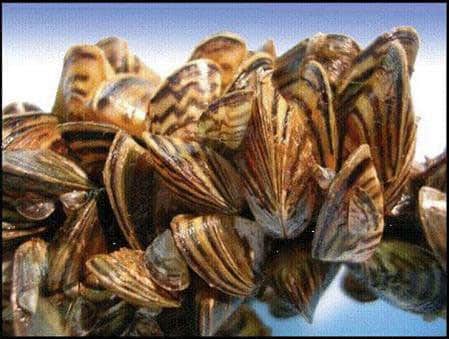Federal officials are warning aquarium hobbyists that common “moss balls” of algae used to clarify water and reduce odor have been found to harbor destructive, live zebra mussels.
The U.S, Fish and Wildlife Service, one of the agencies tasked with removing the invasive zebra mussels from U.S. waterways, urges that the two-inch to four-inch moss balls be destroyed and aquariums in which they were used decontaminated.
U.S. Geological Survey scientists were alerted that zebra mussels were found attached to imported moss balls sold as aquarium plants. Zebra mussels are currently invasive problems in 26 states, including Texas.
“Zebra mussels can quickly take over once they get established in a water body and cause significant damage including disrupting the food chain, changing the chemistry of the water (which can cause more blue green algae outbreaks or offensive taste), and clogging water intake and delivery systems,” the USFWS alert reads. “The concern is that live mussels released into a storm drain or flushed could be introduced into a waterway.”
Officials say the moss balls can be destroyed, along with any potential zebra mussels, by freezing the moss ball in a plastic bag for at least 24 hours, boiling the ball for a full minute or submerging the moss ball in regular, unscented bleach, diluted to one-third cup per gallon of water for 10 minutes, or undiluted white vinegar for 20 minutes.
Some of the moss balls, which cost around $4, are sold under the names Beta Buddy Marimo Balls, Mini Marimo Moss Balls and Marimo Moss Ball Plant, all of which have been found to contain zebra mussels, the Texas A&M AgriLife extension service reported.
Dispose of the moss ball and its packaging in a sealed plastic bag in the trash. If vinegar, boiling water, or bleach was used, “the liquid can be disposed down a household drain — never down a storm drain where it could enter and damage local waterways.”
Aquarium hobbyists should then decontaminate the tank using one of several options listed on the USFWS website at https://www.fws.gov/fisheries/ANS/zebra-mussel-disposal.pdf
Zebra mussels, which are native to Eurasia, probably entered the Great Lakes watershed in the ballast of ocean-going freighters released into one of the Great Lakes.
They are currently found in six river basins in Texas — the Red, Trinity, Brazos, Colorado, Guadalupe and San Antonio rivers.
They also have been confirmed in 24 Texas lakes, although none of them are in South Texas.
“Zebra mussels have already been introduced into many Texas lakes and are causing changes to the ecosystem along with damage to boats, water supply and control infrastructure,” said Brian Van Zee, Texas Parks and Wildlife Department inland fisheries regional director. “It is important that we take all possible precautions to prevent them from being introduced elsewhere.”
Zebra mussels often are transmitted from one watershed to another by trailered fishing boats and pleasure craft that have not been decontaminated between trips.





